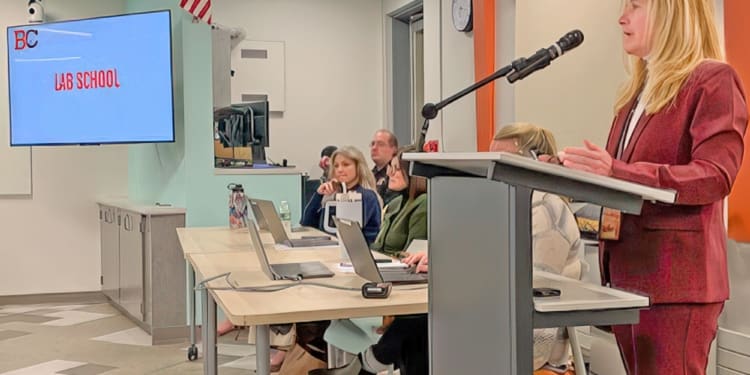DELMAR – At its Feb. 28 board meeting, the Bethlehem Central School Board pushed back against Superintendent Jody Monroe’s decision to phase out the high school’s Lab School by June 2026. Monroe had asked the board to establish a committee to review the Lab School, which the board supported after mandating that parents have a seat on the committee. In addition, the board voted to consider a potential resolution at its next meeting that may reject “pausing” Lab School while that committee does its work.
At the meeting’s opening, board member Ewan McNay challenged the “hypothesis we were given” at the last board meeting that Lab School is not viable due to a lack of student interest and said that conclusion was not supported by the data Monroe presented. McNay, a self-described “data guy,” said that after conducting his own analysis of that information, “you could not reach that conclusion from the data.”
McNay acknowledged low enrollment for 2023, but said that year was an outlier and that the decline in lab school enrollment in all other years was “slightly lower” than enrollment in the regular high school. He noted that one proffered comparison between high school and lab school enrollment did not even use the same time periods. He concluded that, except for 2023, over the past five years, enrollment in the lab school had increased annually, contradicting any claimed lack of interest
McNay added that constituents were complaining to him about a lack of outreach to this year’s eighth grade class and no assembly presenting “charismatic lab school students” to talk about the program.
When asked by board member Robert Tietjen whether there was any level of interest shown by the current eighth-graders at which Monroe would reconsider her choice, Monroe said she could reach out to guidance counselors to see, but she had “not heard that” and still recommended pausing the program.
“We need to look at other cohort options that students will want to enroll in and remain in,” she said.
Board president Holly Dellenbaugh asked why a new freshman class should not be enrolled while the district considers options. Monroe responded that the Lab School ran concurrently during a prior review, but that resulted in a failure to address long-term issues. She also said it was “unfair” to have eighth grade students enroll in a program that could look vastly different “and needs to look vastly different.”
Monroe continued to recommend that current ninth grade students be returned to the general high school at the beginning of the next school year because that class may have only 5-6 students by then.
“I do not view that as a program, and I don’t think any teachers or administrators would say that’s a program,” she said.
Monroe also spoke on “who decides curriculum changes,” a question she said was posed at the last board meeting. Citing board policy 4200 in a Powerpoint presentation, she indicated that curriculum changes, which include permanent deletion of a course or modification of existing programs, are approved by school administrators. According to the policy cited, the building principal and the assistant superintendent for educational programs are responsible for determining whether proposed changes constitute a change in curriculum and the Superintendent makes regular reports to the Board on curriculum related matters.
“When there’s permanent changes to courses long term that they’re no longer included in the high school program that then goes to curriculum council, which is comprised of the same representatives, teachers, principals, supervisors and then ultimately it comes to the Board of Education, usually in November or December,” Monroe said.
Public comment period speakers urged the board to exercise its authority and be the decision maker.
Monroe also asked the board to approve establishing a committee to review the Lab School program and make final recommendations to the superintendent by Fall 2025. Under Monroe’s proposal, the committee would provide periodic updates to the board, and include teachers, supervisors, counselors, administration and a representative from the Board of Education, but only solicit input from middle school staff and counselors, parents, students and alumni.
In a unanimous decision and after hearing from 13 speakers, some who spoke about the need for parent involvement, the board adopted that resolution, but modified it to add parents to the list of required committee members.
McNay offered a further modification of that resolution that, as part of the data gathering, would give current eighth graders an opportunity to learn in an assembly about Lab School from current Lab School students and give the Lab School community the opportunity to follow through “on the discussion of whether enrollment would markedly increase with their support and efforts.” His amendment also called for the current Lab School program to “remain in operation” while the committee considers next steps.
Separating McNay’s amendment from the resolution establishing the committee, the board voted unanimously to revisit at the March 6 board meeting the issue raised by McNay. Dellenbaugh said the board “is voting on a potential resolution at the next meeting. The language we don’t have yet.”



